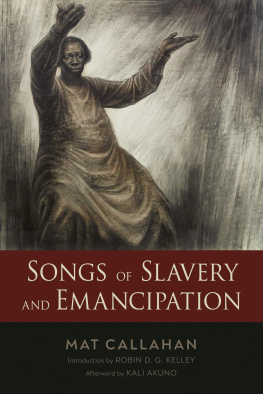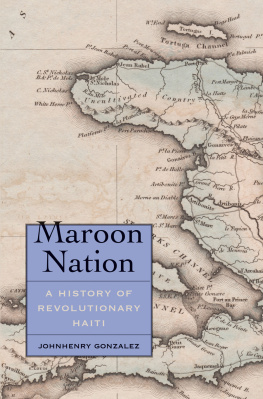Contents

THE COMMON WIND
THE
COMMON
WIND

Afro-American Currents in the
Age of the Haitian Revolution
Julius S. Scott
Foreword by Marcus Rediker

First published by Verso 2018
Julius S. Scott 2018
Foreword Marcus Rediker 2018
All rights reserved
The moral rights of the author have been asserted
1 3 5 7 9 10 8 6 4 2
Verso
UK: 6 Meard Street, London W1F 0EG
US: 20 Jay Street, Suite 1010, Brooklyn, NY 11201
versobooks.com
Verso is the imprint of New Left Books
ISBN-13: 978-1-78873-247-5
ISBN-13: 978-1-78873-249-9 (UK EBK)
ISBN-13: 978-1-78873-250-5 (US EBK)
British Library Cataloguing in Publication Data
A catalogue record for this book is available from the British Library
Library of Congress Cataloging-in-Publication Data
A catalog record for this book is available from the Library of Congress
Typeset in Minion Pro by MJ & N Gavan, Truro, Cornwall
Printed in the US by Maple Press
To my parents and to the
memory of my grandparents
Contents
TOUSSAINT, the most unhappy man of men!
Whether the whistling Rustic tend his plough
Within thy hearing, or thy head be now
Pillowed in some deep dungeons earless den;
O miserable Chieftain! where and when
Wilt thou find patience? Yet die not; do thou
Wear rather in thy bonds a cheerful brow:
Though fallen thyself, never to rise again,
Live, and take comfort. Thou hast left behind
Powers that will work for thee; air, earth, and skies;
Theres not a breathing of the common wind
That will forget thee; thou hast great allies;
Thy friends are exultations, agonies,
And love, and mans unconquerable mind.
This book takes its title from a sonnet William Wordsworth wrote in 1802: To Toussaint LOuverture, the great leader of the Haitian Revolution, who would soon die of pneumonia as a prisoner of Napoleon in Fort de Joux in eastern France.
Julius S. Scott shows us the collective human power behind Wordsworths words. He focuses on the breathing of the common wind, asking who inhaled the history of Toussaint and the revolution and who whispered it all out again as subversive stories, to circulate with velocity and force around the Atlantic. Scott gives substance to Wordsworths beautiful abstraction by showing unconquerable minds at worka motley crew of sailors, runaway slaves, free people of color, maroons, deserted soldiers, market women, escaped convicts, and smugglers. These people, in motion, became the vectors through which news and experience circulated in, around, and through the Haitian Revolution. Scott gives us a breathtaking social and intellectual history of revolution from below.
It would not be exactly right to call The Common Wind an underground classic. Its status as a classic is not in doubt, but the landed metaphor would be wrong: the book is about what happened, not underground, but rather below decks, at sea, and on the docks, on ships and in canoes, and on the waterfronts of rough-and-tumble port cities in the era of the Haitian Revolution. It would, however, be right to say that the book and its reputation parallel the world of sailors and other mobile workers who are its central subject: both have had a fugitive existencehard to find and known about largely through word-of-mouth stories. For decades historians have spoken at conferences in hushed, admiring, conspiratorial tones about Scotts workhave you heard ? From its inception as a doctoral dissertation in 1986, through its endless citation by scholars in a variety of fields down to the present, The Common Wind has long occupied an unusual place in the world of scholarship.
I vividly recall the moment I first heard. Julius S. Scotts friend and mentor at Duke University, Peter Wood, had come in 1985 to Georgetown University, where I taught at the time, to give a lecture. Afterward, as we crossed Red Square and discussed questions that arose about his talk, Wood mentioned that he had a Ph.D. student who was studying the movement by sea of the ideas and news of the Haitian Revolution during and after the 1790s, the decade in which the Atlantic was in flames, from Port-au-Prince to Belfast to Paris and London.
My first words to Wood were, how on earth can someone study that? Bear in mind, I had recently completed a dissertation on eighteenth - century Atlantic sailors, so if anyone could have been expected to know how Scott did it, it might have been me. Even so, I was stunned by Woods description of the projectand more than curious to learn more. Wood put us in touch, Scott and I began to correspond, and a year or so later, after its submission and defense, I read The Common Wind. I was convinced then, and I am convinced now, that it is one of the most creative historical studies I have ever read.
Scott takes on an issue that long vexed slaveowners around the Atlanticwhat one of them in 1791 called the unknown mode of conveying intelligence amongst Negroes. Intelligence is precisely the right word, for the knowledge that circulated on the common wind was strategic in its applications, linking news of English abolitionism, Spanish reformism, and French revolutionism to local struggles across the Caribbean. Mobile people used webs of commerce and their own autonomous mobility to form subversive networks, of which the ruling classes of the day were keenly aware even if latter-day historians, until Scott, were not.
Scott thus creates a new way to see one of historys biggest themes, what Eric Hobsbawm famously called the age of revolution. He shifts our view in two directions: we see the flaming epoch from below and from the seaside. By emphasizing the men and women who connected by sea Paris, Sevilla, and London to Port-au-Prince, Santiago de Cuba, and Kingston, and who then in small vessels connected ports, plantations, islands, and colonies to each other, Scott creates a new, highly imaginative transnational geography of struggle. Instances of resistance from below in various, hitherto disconnected parts of the world now appear as constituent parts of a broad human movement. The forcesand the makersof revolution are illuminated as never before.
The book is populated by long-forgotten figures who once upon a time inspired stories of their own. A Cap Franais runaway called himself Sans-Peur (Without Fear)truly a name with a message, both for his fellow enemies of slavery and for anyone who might try to hunt him down. Nameless African market women in Saint-Domingue called each other sailor, expressing through their greetings a form of solidarity that stretched back to the seventeenth-century buccaneers. John Anderson, known as Old Blue, was a Jamaican sailor who escaped his owner with a huge iron collar around his neck. He eluded recapture along the waterfront for fourteen years, during which time his reputation was as long and distinctive as his graying beard (74). The richness of the books narrative is extraordinary.
A key to Scotts work is the port city, where mobile peoples from around the world came together to work. Brought into cooperative laboring relationships by transnational capital to move the commodities of the world, these workers translated their cooperation into projects of their own. Scott shows how the capitalist mode of production actually worked in port cities, not only generating massive wealth through trade, but also producing oppositional movements from below. As the miserable Lord Balcarres, governor of Jamaica, explained in 1800, turbulent people of all nations made up the lower class of Kingston. Characterized by a general levelling spirit throughout they were primed for insurrectionready to torch the town and leave it in ashes (70). Scott shows how the waterfront became a cauldron of insurrection (114) and how transnational cycles of unrest erupted in many port cities during the 1730s, the 1760s, and the 1790s. The last of these exploded into an Atlantic-wide revolution.














